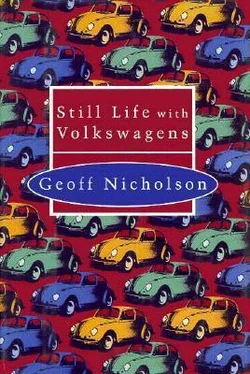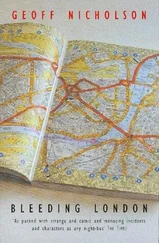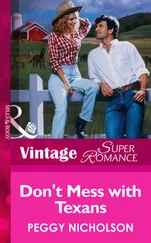He also feels there’s going to be a little difficulty in accommodating Charles Lederer. They can hardly share one caravan, if for no other reason than, as Barry has found out in the course of this return trip, the old man has a disturbingly ripe odour about him. Perhaps that ought to be irrelevant to an aspirant to wisdom such as Barry, and certainly he knows he can’t leave a fellow traveller stranded on the sliproad of life, but he thinks life will be much easier if he can get the old boy set up in a one man tent, preferably on the far side of the site.
The old place looks familiar enough, and yet Barry senses immediately that there’s something different about it. There’s something in the air. There’s a feeling of hussle about it, an animation among the holidaymakers, a hint of anxiety.
The moment Enlightenment appears outside Barry’s caravan, a tiny, familiar figure comes running. It is the Ferrous Kid and he’s extremely excited. He’s glad enough to see Barry, but that isn’t the major cause of his excitement. Barry gives him a cheerful wave but after his long drive he thinks he isn’t quite ready to cope with the kid’s boundless and exhausting energy. However, he needn’t have worried.
“I took your advice,” the kid says happily. “I don’t joyride any more.”
“Oh good,” says Barry.
“Not even responsibly.”
“I’m very glad.”
“Who’s the old guy in the car?”
“Don’t ask,” says Barry.
The kid shrugs then says, “Anyway, you got back just in time.”
“In time for what?”
“There’s a big meeting going on at the site owner’s house. Everyone’s going.”
Barry says he can’t be bothered to go to any meeting with the site owner. How could it possibly be of relevance to him? But the kid is insistent and he grabs Barry by the elbow and hurries him along. As he goes Barry looks back at Charles Lederer, still seated in Enlightenment, and he hopes he’ll not get into trouble before he gets back.
As he walks along with the kid, he sees that people from all over the caravan site are heading in the same direction, and by the time they get to the house they’re part of a crowd. It isn’t a vast crowd, perhaps only a hundred or so strong, but the people look hostile and angry and Barry asks the kid what this is all about. The kid assures him it will be obvious soon enough.
Sam Probert, the site owner, lives in a pleasant but modest stone-clad house only a few hundred yards from the caravan site. There is a white fence and a carefully laid out and tended front garden with a decorative miniature windmill and an ornamental pond. The crowd, however, has no respect for the niceties of garden design. They clamber over the fence and trample all over the lawn and flowerbeds. The arrival of such a mob would bring most proud house owners running to their front door demanding to know what they think they’re doing, but this particular house owner knows exactly what they’re doing. They ring his doorbell and hammer on the glass of the bay window, but Sam Probert declines to appear.
This only maddens the crowd. They become increasingly restless and vocal, and then someone, probably deliberately, knocks over the miniature windmill, which tumbles into the ornamental pond and shatters into plaster fragments. This is quite a crowd pleaser, and one or two people pick up lumps of the plaster and hurl them towards the house, and it is this action which finally brings out the owner. He doesn’t come to the front door, that would be far too risky, but his face does appear at an upstairs window. He looks out nervously and slowly raises the window, fearing that further lumps of plaster might be aimed at his head.
Barry’s dealings with Sam Probert have always been brief and pleasant enough. He has never appeared to Barry to be the sort of man who would provoke such passion and hatred in his neighbours and caravanners. Certainly his appearance placates the crowd a little, but after a while, when he simply stares out and says nothing, they soon become rowdy and incensed again. This is not Barry’s idea of a ‘meeting’ as promised by the kid; rather it provides an opportunity for the crowd to abuse the man at the window. Someone calls him a money-grubbing bastard, and someone else shouts something about forty pieces of silver, but Barry can’t follow this at all. Not surprisingly, the crowd’s antagonism only provokes defiance in Sam Probert, and after listening to a few more insults he’s definitely had enough.
“They’re my bloody fields and I’ll do what I want with them,” he bellows back.
“It’s a disgrace,” says one of the more articulate protesters. “It’ll be chaos. There’ll be noise and smells, and dogs and children, and people revving their engines and loud music and drugs, unprotected sex and people peeing in the street.”
“I’ve hired quite a few chemical toilets,” Sam Probert protests weakly, but this does not satisfy the crowd at all.
Things look as though they might turn decidedly ugly, and Barry wants no part of that, so he manhandles the kid away from the house, to safety.
“I still don’t have a clue what this is all about,” Barry says.
“ I think it’s brilliant,” says thef kid. “You know the old bugger also owns two fields adjacent to the site?”
“No, I didn’t,” says Barry.
“Well anyway, he’s rented them both out for this weekend. He’s rented one out to a Volkswagen enthusiasts’ club for some shindig called Bug Mecca and he’s rented the other one out to a bunch of New Age travellers for a Gathering of the Tribes. It should be hell on earth. I can hardly wait.”
♦
The same old scout hut but now with some new Nazi regalia; flags and banners, medals and uniforms, and a more intense air of aggression and stupidity and casual destructiveness emanating from the skinheads. Phelan appears before his boys, his disciples. Tonight he is feeling expansive and he gives them a brief tour of his favourite obsessions; that the Jewish Holocaust was a myth, that Adolf Hitler in fact had a full complement of testicles, and that AIDS can’t be such a bad thing if it kills off gays, drug users and Africans. He can feel his power growing, a strange potent energy that passes from his boys to him.
The skinheads are feeling good too. Thanks to Phelan they have more money than they know what to do with, and they now appear in a stylish, not to say positively mannerist, array of cherry red DMs, Ben Shermans, Crombies and Harringtons. Butcher has even taken to wearing a bowler hat. Phelan is faintly disappointed by this. He was hoping to steer them towards a more paramilitary look, but he doesn’t want to push them too far too fast. There is money for any amount of extra strong lager, for Oi records and for new tattoos of staggering scope and complexity.
Tonight there is almost a party atmosphere, something helped along by the presence of Renata Caswell. She has told Phelan how turned on she gets by a good collection of skinheads and that’s an interest he wants to encourage. She is dressed in the shortest of leather skirts and a Luftwaffe bomber jacket, hardly skinhead gear, but the lads are nevertheless juiced up by her presence. Only Butcher seems to be less than one hundred per cent sanguine. Something is bothering him, and it does have something to do with a woman.
“What happened to the girl?” he asks Phelan.
“What girl would that be?”
“Come on. Don’t fuck about. The one we found in that house. The one we kidnapped for you.”
“She’s being taken care of,” Phelan says.
There is much dirty laughter from the other skinheads, though not from Butcher.
“What’s that supposed to mean?” he insists.
Phelan says nothing, just looks across at Renata and smiles. But Butcher won’t be shaken off that easily.
Читать дальше












